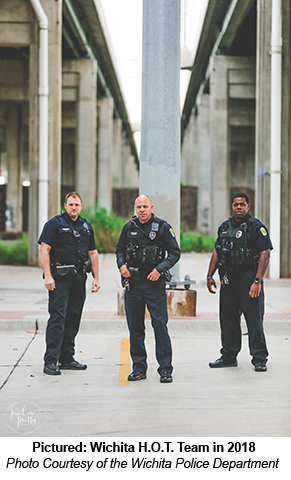Contact Us
To provide feedback on the Community Policing Dispatch, e-mail the editorial board at CPDispatch@usdoj.gov.
To obtain details on COPS Office programs, publications, and resources, contact the COPS Office Response Center at 800-421-6770 or AskCopsRC@usdoj.gov

U.S. Department of Justice
Office of Community Oriented Policing Services
Washington, DC 20530
 The Center for Court Innovation, in partnership with the COPS Office, has launched Sharing the Solution: Police-Court Partnerships to Address Homelessness. This project explores the innovative strategies law enforcement agencies share with local partners when responding to homelessness. Throughout the course of this work, experts explain homelessness as a public health issue and offer guidance on how police can be a part of the solution.
The Center for Court Innovation, in partnership with the COPS Office, has launched Sharing the Solution: Police-Court Partnerships to Address Homelessness. This project explores the innovative strategies law enforcement agencies share with local partners when responding to homelessness. Throughout the course of this work, experts explain homelessness as a public health issue and offer guidance on how police can be a part of the solution.
How does public health intersect with homelessness and policing? Throughout their years of service, police develop relationships with these individuals. Each day, law enforcement connects people experiencing homelessness to emergency housing services, medical care, and most recently personal protective equipment (PPE). Further, in times of crisis, police are called as first responders for homeless individuals in need of care.
Once a year, the U.S. Department of Housing and Urban Development (HUD) conducts a point-in-time (PIT) count. The PIT count is a yearly counting of sheltered and unsheltered individuals across the country. In January 2019, HUD reported that 567,715 were experiencing homelessness during the most recent PIT count.1 Disparities unfortunately exist within the homeless population. African Americans make up approximately 13 percent of our country’s population; yet approximately 40 percent of the homeless population, or 553,000 people, identified as African American. Of homeless individuals with children, 52 percent were African American.
The PIT count shows 200,000 individuals, or half of people experiencing homelessness, are unsheltered. Compared to their sheltered counterparts, unsheltered individuals are shown to be at a higher risk of illness and disease. A study of this group found that unsheltered people are more than four times as likely as sheltered people to report a physical health condition, nearly one and a half times as likely to report a mental health condition, more than five times as likely to report a substance abuse condition, and 25 times as likely to report all three conditions at once.2 Now, facing COVID-19, it is expected that these numbers will continue to rise. With these realities, police often find themselves as the bridge between homeless community members and supportive services.
Seeing the great need to support and serve this population, local law enforcement agencies and inspired officers have developed specialized response teams and partnered with legal and health professionals to respond to people experiencing homelessness. At the heart of these initiatives are police partnerships with local providers committed to working with this population to assist them in receiving the care and services they need for healthier and safer lives. When these partners come together to share solutions, people experiencing homelessness have safe access to housing as well as medical and behavioral health care. In these difficult times, police partnerships are even more vital. In fact, the Centers for Disease Control and Prevention (CDC) is calling for a “whole community approach” to COVID-19 where law enforcement, housing authorities, health providers, and other local stakeholders work together to support people experiencing homelessness.3 Thankfully, the field has strong examples of police partnerships that can guide the way to supporting people experiencing homelessness and responses to the public health crisis.
 Examples of these partnerships include police officers across the country that serve on specialized teams designed to assist the homeless population to get shelter and medical services. In Wichita, Kansas, the police department’s Homeless Outreach Team (H.O.T. Team) works with service and housing providers to connect homeless individuals to vital and lifesaving services. The Wichita H.O.T. team is committed to working with their health, housing, and justice partners to divert homeless individuals from local jails and connect them to social services. Austin, Texas, is home to the Homeless Outreach Street Team (HOST team). Here, police partner with the Downtown Austin Community Court for case management services as well as the Austin/Travis County emergency medical services (EMS) department and peer navigators to offer this population wraparound services that aim to connect their clients to housing and health services. These programs showcase best practices by illustrating how partnerships and sharing solutions can have real life impact for our most vulnerable.
Examples of these partnerships include police officers across the country that serve on specialized teams designed to assist the homeless population to get shelter and medical services. In Wichita, Kansas, the police department’s Homeless Outreach Team (H.O.T. Team) works with service and housing providers to connect homeless individuals to vital and lifesaving services. The Wichita H.O.T. team is committed to working with their health, housing, and justice partners to divert homeless individuals from local jails and connect them to social services. Austin, Texas, is home to the Homeless Outreach Street Team (HOST team). Here, police partner with the Downtown Austin Community Court for case management services as well as the Austin/Travis County emergency medical services (EMS) department and peer navigators to offer this population wraparound services that aim to connect their clients to housing and health services. These programs showcase best practices by illustrating how partnerships and sharing solutions can have real life impact for our most vulnerable.
By implementing a whole community approach to public health and homelessness, police and their partners offer connections to emergency shelter, comprehensive case management, and medical care to those in need. The Center for Court Innovation hosted a conversation with law enforcement and policy experts on November 17, 2020 to discuss the relationship between police and people experiencing homelessness. The panel discussed how we got here and how coming together to share the solutions guides a way forward. You can also view the first and second webinars of the series discussing mental health courts and evaluation best practices.
Bonnie Sultan
Special Advisor
Center for Court Innovation
References:
1 National Alliance to End Homelessness, “The State of Homelessness: 2020 Edition,” accessed October 14, 2020, https://endhomelessness.org/homelessness-in-america/homelessness-statistics/state-of-homelessness-2020/.
2 Janey Rountree, Nathan Hess, and Austin Lyke, Health Conditions among Unsheltered Adults in the U.S., policy brief (Los Angeles: California Policy Lab, 2019), https://www.capolicylab.org/wp-content/uploads/2019/10/Health-Conditions-Among-Unsheltered-Adults-in-the-U.S.pdf.
3 Centers for Disease Control and Prevention, “Interim Guidance for Homeless Service Providers to Plan and Respond to Coronavirus Disease 2019 (COVID-19),” last modified November 3, 2020, https://www.cdc.gov/coronavirus/2019-ncov/community/homeless-shelters/plan-prepare-respond.html.
Subscribe to Email Updates
To sign up for monthly updates or to access your subscriber preferences, please enter your email address in the Subscribe box.






